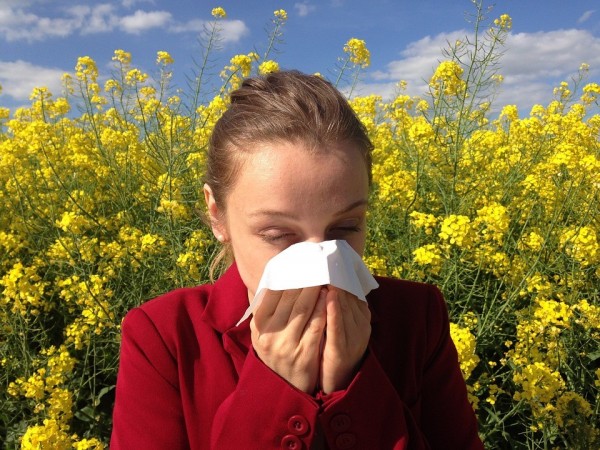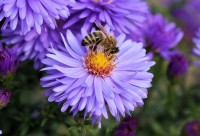10 Tips for Allergy Sufferers
August 28, 2018 at 9:59 AM

Do you suffer from allergies? If so, you’re not alone, with estimates as high as 1 in 3 Kiwis suffering from all kinds of allergies (seasonal, environmental and contact) combined (1). Other sources approximate the number of hay fever sufferers to be about 20% of the total population of New Zealand (2).
While these figures don’t have hard scientific evidence to back them, they do highlight how common this problem is. If you’re one of the millions of people who deal with the bothersome symptoms associated with seasonal allergies - you may be searching for some tips on how to combat them. Fortunately, there are some straightforward actions, which can help to reduce your symptoms this allergy season.
Tip #1 : Be Mindful of the Forecast
You’re probably quite accustomed to looking up the expected weather for the next few days. This helps you to plan your activities, pick out suitable clothing and be prepared for specific weather conditions like rain. In fact, you probably wouldn’t dream of doing without the weather report, when going about your everyday routine.
Yet, you may not know that the same type of forecasting is available for allergy sufferers. Popular sites like Metservice Allergy Forecast , provide a 5 day picture of what the pollen count will look like in the near future from October to April each year. This allows you to adjust the dosage of your usual medication, such as increasing your dose on heavy pollen days. Or, you may add another medication to your regimen (like a nasal spray), when the allergen load will be particularly severe. Other sites such as Allergy NZ publish an annual pollen calendar Allergy NZ Calendar
Finally, you may use allergy forecasts to help you plan outdoor activities - so they fall on a day when the pollen count (or other allergens like ragweed) are low. This type of information can make a significant difference in your quality of life, by letting you know beforehand when it’s best to just stay inside (3).
Tip #2: Shower Before Bed
While you likely take a shower on a daily basis, it’s important to examine your routine if you suffer from severe allergies. When you’re outside, pollen can stick to your skin and clothing. This is especially true, if you’re doing activities like mowing the grass or weeding the garden - as these can leave you with a significant amount of allergens on your person.
Failing to change your clothes and take a shower before bed, can transfer all of these accumulated allergens onto your bedsheets. Most importantly, if your pillowcase is contaminated with these substances - you could suffer from a runny nose, itchy throat and eyes, sinus congestion and even trouble breathing. Since this could impact the quality of your sleep, be sure to rinse off after engaging in any extensive outdoor activities (4).
Tip #3: Don’t Neglect Your Spring Cleaning
If your allergies are due to dust, dander or mould - then spring cleaning can help combat them. Your home is likely shut up for most of the winter because of the cold weather, and all of these allergens have a tendency to pile up. While you no doubt vacuum and dust your home all through the year - a deep cleaning in the spring can help to reduce any buildup. This could leave you breathing easier overall, and decluttering your space should make you feel lighter as well (5).
Tip #4: Use a HEPA Filter
While keeping your windows closed and doing a thorough spring cleaning can help, it’s impossible to keep all dust, dander, mould spores and pollen out of the air in your home. The best defense against any allergens that are still present after cleaning - is to purchase a high-quality HEPA filter for your home (6).
There are many different types, sizes and ratings available. You’ll want to do some research, and purchase a unit that’s rated for the size of room or space in which it will operate. Another option is a whole-house HEPA filter installed in your HVAC system, and you can even add truly industrial strength options like a UV light to kill airborne pathogens (such as viruses).
If your HVAC system doesn’t already have a whole-house filter installed, the cost to add one may be reasonable or prohibitive, and this can depend upon your particular model. Also, don’t make the common mistake of thinking that your disposable furnace filter can take the place of a heavy-duty HEPA filter - as there’s usually no comparison between the two.
Tip #5: Wear Protective Gear
If you’re going to be doing an allergen-intensive activity, such as weeding the garden or washing the dog - consider wearing some protective gear. Options like gardening gloves are good for chores that don’t involve too much water.
For a task like washing the family dog, however, nitrile gloves are a better option (because they’re waterproof). You may not think that gearing up in this way is necessary, if you’re not allergic to canines. Yet, your pet Fido likely rolls around in the grass, runs through weeds and generally gets all manner of allergens stuck to its coat.
Tip #6: Use a Neti Pot
These products have grown in popularity in recent years, as they’re a mechanical way to flush out your sinuses. This removes any allergens that are stuck in your nasal passages, and can help to break up any mucus buildup (which can cause terrible sinus pressure and pain) (7). Also, no medication is required, as this all-natural remedy uses just purified saline solution (which is purified water with a bit of salt added).
It is important to keep in mind, that you must use purified water (or boil your tap water to remove contaminants). Your nasal and sinus tissues are incredibly delicate, so flushing them with tap water that contains small amounts of impurities and sometimes bacteria can lead to infection (and deaths have even been reported) (8).
Also, some research shows that daily use of a Neti Pot on a long-term basis, is actually worse for your sinus health. One study found that many daily users who discontinued this practice, saw much fewer sinus infections (9). Therefore, it’s likely best to use this treatment sparingly, only when your sinuses are acting up more than usual - and this was the conclusion of at least one doctor running this study (10).
Tip #7: Don’t Waste Money on Local Honey
A common urban myth that’s floating around, is that eating local honey can improve or eliminate your springtime allergies. While this sounds good and makes sense on the face of it, the science doesn’t back up the claims. The research on this topic is thin, but two studies found that eating local honey did nothing to ameliorate participants’ allergy symptoms.
improve or eliminate your springtime allergies. While this sounds good and makes sense on the face of it, the science doesn’t back up the claims. The research on this topic is thin, but two studies found that eating local honey did nothing to ameliorate participants’ allergy symptoms.
The second study is actually often misquoted as proof for the pro-honey camp, but if you carefully review its findings - it concludes otherwise. Study participants who ate local honey had no change in their symptoms. It was only those people who were given local honey, to which birch pollen was manually added in ever-increasing doses, that saw improvement (11).
This is a form of immunotherapy, where you are given miniscule doses of the substance you’re allergic to - and you then work up to higher amounts. Over time your body can become desensitized to the substance (if the process is successful) - causing your allergies to improve or go away altogether.
Other problems with the honey theory, are that the amount of pollen is not standardized (working up gradually is important with immunotherapy) and bees only collect pollen from flowers. Why does that matter? According to WebMD, most people are allergic to the pollen from grass, trees and weeds. Flower pollen isn’t usually the culprit behind your springtime allergies - which may be why eating local honey to reduce allergies just doesn’t work (12).
So while buying local honey is good from a sustainability standpoint - don’t expect it to cure your seasonal allergies.
Tip #8: Use Hot Water For Your Laundry
According to popular New Zealand company Earthwise, which has a line of cleaning and personal care products that are solely plant-based, the temperature of your water matters. When doing your laundry, Earthwise asserts that you need to hit the 55 degree Celsius mark or higher, in order to get rid of the most allergens possible on your clothes and linens (13).
Just be careful to read the labels first - as you don’t want to shrink your favorite shirt in your quest to stop sneezing!
Tip #9: Don’t Air Dry Your Clothes
Another laundry tip that could help reduce your symptoms this spring, at least one reputable source recommends that you stop hanging out your clothing to dry (14). While this gives your laundry a fresh, sun-kissed fragrance - it could be doing a number on your sinuses. Pollen and other allergens can accumulate on your freshly washed clothing and linens, giving your system more histamine producing substances to deal with. So, opt for your indoor dryer instead, to help keep your allergies at a more manageable level this year.
Tip #10: Get Checked For Asthma
You may attribute your trouble breathing to run-of-the-mill seasonal allergies - but it could be something far more serious. The fact is that 1 in 5 people who have allergic rhinitis, could have full-blown asthma as well (according to the European Academy of Allergy and Clinical Immunology) (15). Since you’ll likely need different medication to deal with your asthma symptoms, which you’ll probably take in addition to your allergy prescriptions - it’s important to discover if you have undiagnosed asthma.
If you find out that you’ve been unknowingly dealing with asthma, then getting the proper treatment can significantly improve the ease of your breathing. It can also help you to avoid any serious complications, from leaving this sometimes serious condition untreated.
SOURCES:
(1)
http://www.earthwise.co.nz/news/combat-contact-allergies
(2)
http://www.goodhealth.co.nz/health-articles/article/allergy-relief-managing-symptoms
(3)
https://www.webmd.com/allergies/allergy-tips
(4)
https://yalehealth.yale.edu/more/allergy-tips
(5)
(6)
https://weather.com/health/allergy/news/2018-03-16-spring-cleaning-allergy-tips
(7)
https://www.mayoclinic.org/diseases-conditions/hay-fever/in-depth/seasonal-allergies/art-20048343
(8)
https://www.medicaldaily.com/3-common-neti-pot-dangers-and-how-avoid-them-258177
(9)
https://abcnews.go.com/Health/WellnessNews/frequent-neti-pot-sinus-infections/story?id=9054035
(10)
Ibid.
(11)
https://www.allergypartners.com/allergy-myth-busters-local-honey/
(12)
https://www.webmd.com/allergies/features/does-honey-help-prevent-allergies#1
(13)
http://www.earthwise.co.nz/news/healthy-cleaning-tips-for-asthma-and-allergy-sufferers
(14)
https://www.mayoclinic.org/diseases-conditions/hay-fever/in-depth/seasonal-allergies/art-20048343
(15)
http://www.eaaci.org/patients/practical-advice/tips-for-allergies.html



